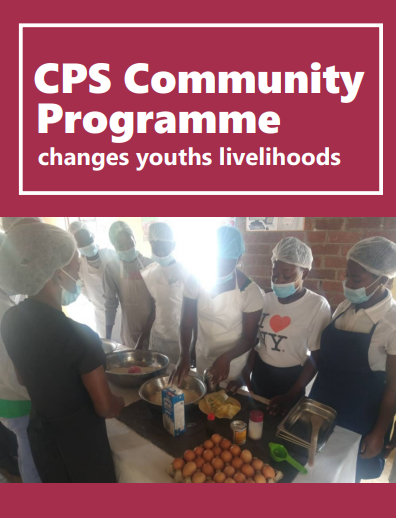Livelihoods
Livelihoods
Zimbabwe has faced food insecurity due to persistent droughts and economic downturn, to floods and cyclones as climatic events have increasingly become an issue globally over the years. These occurrences have had a negative impact on the resilience of families to absorb these shocks when they happen. Vulnerable households have had a harder time meeting the most basic needs resulting in one and sometimes less meals a day, loss of shelter and livelihoods and having difficulty keeping children in schools and ensuring they have the access to health services that they need.
It is based on this that Child Protection Society has supported vulnerable communities with livelihoods interventions that aim to improve the resilience of households so that they graduate from using all their income on basics such as food hence realising other achievements that improve the overall economic status of families, ensuring that there is access to basic services for children.
Work readiness and Community Apprenticeship for young people
Child Protection Society is supporting young girls and boys who are out of school with work readiness and community apprenticeship. The community apprenticeship approach is a grassroots solution which utilises skills already there in the community to build young people skills in various areas including welding, solar installation and maintenance, garment making, hairdressing, and motor mechanics amongst others.
The work readiness component ensures that young people who will participate in these community apprenticeships have an appreciation of professional conduct and presentation in the workplace and are clear about the goal of the placement for both themselves and the community-based trainers to foster responsibility.

Caregivers Selection Planning Management (SPM) of business and Internal Savings and Lending (ISAL) training
Child Protection Society recognises that children do not live in a vacuum. They live within families that support and keep them safe. However, when this family is not able to meet the needs of children due to various constraints, there is need to support the household to build its resilience to not only meet the basic needs of children but to absorb future shocks. As a result, CPS targets the primary caregivers of beneficiaries of its programs with SPM of business and ISAL training. The SPM training helps trainees to select an income generating project based on their skill set, market, strengths, and interests. Caregivers receive ISAL training which is a community-based lending system where caregivers self-select into groups and build a fund from which group members may borrow funds to grow their business. As the fund grows so do the lending amounts. CPS has reached over 3,000 caregivers through this intervention.
Community programme
The future of a total of 100 youths aged between 18 and 24 years from
Harare’s Glenview, Warren Park, Kuwadzana, Dzivarasekwa, Mufakose,
Budiriro, Rugare and Kambuzuma suburbs will never be the same again
as the Child Protection Society(CPS) and Egmont Trust partner the
community to enrich their lives with community-based apprenticeship
skills.
The 3-month Community Based Apprenticeship is enough to keep the
youths off the streets and stop them from indulging in activities that are
harmful to their wellbeing. The program offers practical skills in different
disciplines namely baking and cooking, garment construction, nurse aid,
solar installation, carpentry and welding.
CPS works with various community leaders to identify participants of the
program, most of whom are disadvantaged and marginalised children.
The groups are trained by community-based local entrepreneurs and led
by community volunteers, who are specialists in community
development and Child Care Workers.
The Community Based Apprenticeship Programme is important to the
community.
“The community has been very supportive of the project by absorbing
apprentices for job placements so that students gain practical and
hands-onexperience. Upon completion of the program the students will
be awarded certificates to use to secure employment and start their own
enterprises”, said Grace Simango ,CPS Project Lead for the Community
Based Apprenticeship Programme.
The NGO News Digest team had the privilege to witness one of the
community initiatives in a Baking and Cooking session. The participants
were happy with such a life-changing opportunity and to be able to learn
something new.
For Natasha Ngwenyeni, 24, of Glen View 1, baking has kept her out of the
streets and has positively influenced the quality of decisions she makes.
Upon seeing people living off baking as a livelihood source, Natasha
decided to be part of the life-changing income generating project.
“Proceeds from baking will help me foot some bills including buying
sanitary ware for myself rather than ask for money from my mother”, she
added.
Alex Chitawo affectionately called “Chef Alex”, 23 of Glen View 8, another
project participant is grateful for the opportunity to cook for the community as it has always been his passion.

“I have always loved cooking and even at home, my parents know how
much I love cooking. I even enrolled for a cooking class back then but,
unfortunately, I could not pursue the programme due to monetary
challenges,” said Alex.
“My dream is to be a chef, owning a restaurant or even a food truck in the
CBD where people will be able to taste some of my products. I will be able
to sustain my family and my own needs, through such an initiative,” he
added.
A local trainer, Moilah Mnemo, who has been part of programme for the
past 3 years, believes the programme is working to the advantage of the
community and the youths as well.
“Jobs are hard to find these days and this programme provides a decent
opportunity to a disadvantaged section of the community the platform to
tap into their talents. Ultimately, we are looking forward to them making a
living out of the programme”, said Moilah Mnemo.
Working with youths has afforded Moilah and other community leaders an
opportunity to understand them better and enable them to counsel and
guide them accordingly for a better and brighter future.
